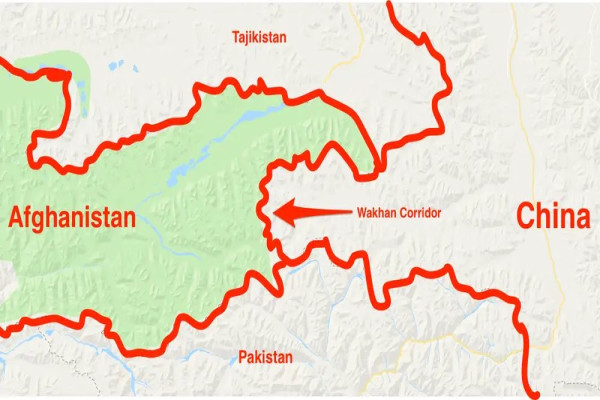
Did the Great Game in Afghanistan die when the Taliban took over Kabul in August 2021? If it didn’t die, it may have been dormant, waiting for the pieces to fall into place for the next round to start.
On Wednesday, a post on X attributed to Taliban spokesman Zabiullah Mujahid the announcement that “Afghanistan and China will be connected through the Wakhan Corridor road this year.”
According to the post, Mujahid said his government could earn $6 billion in transit revenues every year.
Mujahid has been pretty consistent on the Wakhan Corridor highway ever since construction first began, reportedly in Nov 2023.
“The area of the Wakhan road to the Chinese border is 60 km,” the private Kabul-based Ariana News quoted him as saying in a report. “Currently the machinery of the Ministry of Defence and the Ministry of Public Works is there and they are being used.”
The corridor in Afghanistan’s north eastern Badakshan province provides access to China’s Xinjiang province through the Wakhjir Pass, situated at an altitude of more than 16,100 feet. Although construction was expected to be completed last winter, clearly that is not the case given difficult terrain, logistical issues and of course the harsh weather.
As and when work is done, it is expected to reduce Afghanistan’s near total dependence on Pakistan’s Karachi port and other transit routes for trade. But it’s not clear how sustainable such trade could be given the remote nature of the region and the consequent higher expense involved in moving goods.
That aside, assessments in India say China gets a leg up in Afghanistan once the Wakhan road is operational. A senior former intelligence officer, says it gives Beijing a land corridor entry into Afghanistan independent of Pakistan and frees them from transit through restive Pakistan Occupied Kashmir where anti-Islamabad sentiment makes Chinese a fair target. There’s more.
“China has its eye on Afghanistan’s mineral wealth estimated at more than $4 trillion dollars,” said Maj. Gen. Sanjay Meston, (Retd), India’s former defence attache in Kabul (2011-14). “And this is where America’s renewed interest holds out the possibility of a return to Afghanistan.”
Gen Meston points to recent developments to buttress his argument. Last Sunday (Mar 23), Afghanistan’s Tolo News carried an interview of Zabiullah Mujahid with the Al Arabiya TV channel where he was quoted as saying “Negotiations for handing over the Afghan embassy in the US are ongoing. This is the beginning of talks and understanding.”
His comments were in the context of the visit (Mar 20) of a US delegation led by Zalmay Khalilzad, former ambassador to Afghanistan. Although the visit was ostensibly linked to the release of an American national in Taliban custody, there was more.
Mujahid said “We also want the US embassy in Kabul to resume its activities so that relations and understanding between the two countries can be established and they can reach a trustworthy level of cooperation through diplomacy.”
Meston believes the Trump administration is wary of the free rein the Chinese appear to be having in Afghanistan and therefore the outreach to the Taliban.
“Note also that the US has lifted the $10 million bounty on the head of Sirajuddin Haqqani, the powerful interior minister in the Taliban administration. Also revoked was the bounty on Abdul Aziz Haqqani and Yahya Haqqani, his relatives,” Meston said.
The Haqqanis are blamed for the deadly attack on Kabul’s Serena Hotel in Jan 2008, which resulted in the death of six people including an American citizen. The US State Department’s Rewards for Justice website no longer lists Sirajuddin.
Incidentally, the Haqqanis are also blamed for the attack on the Indian embassy in Kabul the same month, killing the Defence Adviser Brig Ravi Mehta, the Political Counsellor Venkateswara Rao and more than 60 others.
Do the new shifts in the Afghan chessboard affect Pakistan? The Haqqanis are known to be close to the ISI (Inter-Services Intelligence) and the US outreach may also leverage the Pakistani connection.
Does that imply Pakistan back in Uncle Sam’s good books? Maybe not entirely, says the former intelligence officer. As the US has demonstrated, it does not need Pakistan to talk to the Taliban and the latter would prefer interacting directly rather than through Islamabad.
Where does that lead India, which may need to up its game in Kabul. It could involve restoring the embassy to normal status and sending an ambassador. But the Taliban has not relented on its treatment of women.
It’s long term intentions remain unclear and the presence of various terror groups on Afghan soil suggest they may have ambitions beyond their borders.
Thirty eight years in journalism, widely travelled, history buff with a preference for Old Monk Rum. Current interest/focus spans China, Technology and Trade. Recent reads: Steven Colls Directorate S and Alexander Frater's Chasing the Monsoon. Netflix/Prime video junkie. Loves animal videos on Facebook. Reluctant tweeter.




